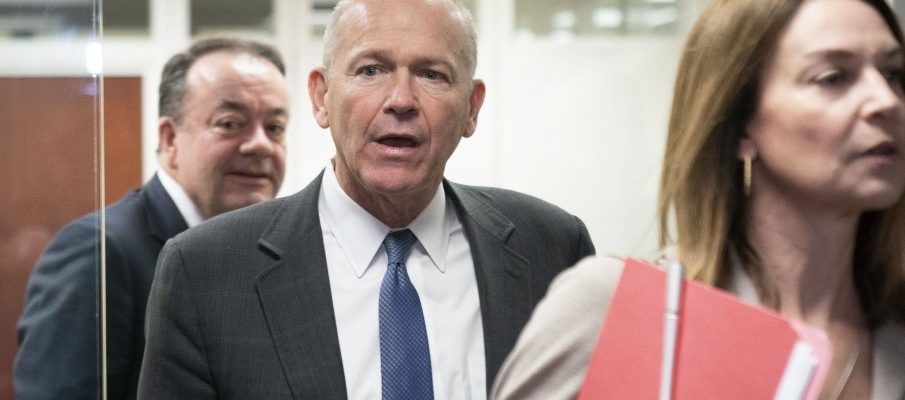After years of crisis, the American aviation group Boeing is now deciding on drastic consequences at the top of the company. Company CEO David Calhoun will step down from his post at the end of 2024. The head of the board of directors, Larry Kellner, will no longer appear at the next general meeting. And the head of the civil aircraft division, Stan Deal, will lose his job with immediate effect. Stephanie Pope, previously operational boss of the entire company, is now taking over the most important business area.
Calhoun explained his decision, which was anything but voluntary, in a letter to employees. Being CEO of Boeing was “the greatest privilege of my life,” said the 66-year-old. He had been thinking for a long time about when would be a good time for a change in the chairmanship of the board. “The eyes of the world are on us,” says Calhoun. “I know we will come through this moment a better company.”
Boeing has been in a downward spiral for several years from which Calhoun and his people have been unable to find a way out. In 2018 and 2019, two machines crashed 737-Maxseries, 348 people were killed. The investigations revealed that sloppy and hastily developed tax software played a crucial role. The Max was not allowed to fly anywhere in the world for almost two years. Boeing lost significant market share, Airbus currently dominates the short and medium-haul aircraft segment.
Boeing has also been plagued by quality problems in production for a long time: among other things 737 and long-haul aircraft 787, of which very few machines were also delivered for almost two years. Most recently, the accident involving an Alaska Airlines737 On January 5th, the company’s crisis accelerated dramatically: employees had forgotten to reinstall four screws after a repair during final assembly. During a commercial flight, a part of the fuselage came off; only with luck it did not result in a catastrophe with many fatalities.
The American Federal Aviation Administration (FAA), which has previously been accused of lax supervision of Boeing, responded with draconian measures and several audits. Boeing is allowed to stop production 737 do not expand over 38 machines per month. Significantly fewer jets are currently being delivered. Ultimately, the FAA recently demanded a precise plan within 90 days on how Boeing wants to get the quality defects under control. At the same time, airlines and leasing companies are complaining because the problems are also causing drastically delayed deliveries. Numerous airlines in Europe are also affected, including Lufthansa and Ryanair. A change at the top of Boeing no longer seemed to be avoidable.
Another candidate for successor: Stephanie Pope
The big unanswered question now is who will succeed Calhoun (at the latest) at the end of the year. The new chairman of the board of directors is to be the former CEO of Qualcomm, Steven Mollenkopf. The 56-year-old has been a member of the supervisory board since 2020 and will now also lead the search for a successor to Calhoun. It’s quite conceivable that he will take on the role himself.
Another candidate is Stephanie Pope, 51. The former head of Boeing Global Services has been with the company for 30 years and only took on the newly created role of Chief Operating Officer at the beginning of the year. Main task: To stabilize production in the various Boeing divisions and to get problems with the most important suppliers under control. At the beginning of the year, observers had already suspected that Pope was being groomed as Calhoun’s successor.
But now the cards are being reshuffled. First, it takes over Boeing Commercial Airplanes, i.e. the civil division, from Stan Deal, which could no longer be retained. The fact that Calhoun doesn’t want to leave until the end of the year could also be because she wants to give her a little time for the next step. However, what could be seen as a disadvantage for her is that she is not an engineer, but, like Calhoun, studied accounting and is very strongly rooted in the previous corporate culture.
Many industry experts are calling for a more radical new start with outside expertise. As part of the restart, Boeing would also have to find a successor for the 737 Max develop, a project that, according to current estimates, would cost around 15 billion.

